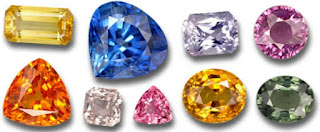Natural faceted saphire gemstone
Natural faceted saphire gemstone
The cut of any saphire gemstone is a big determinant in it’s value and appeal. Saphire rough can be cut into various shapes with different cut styles, depending on it’s quality and color. There are many factors when deciding how to shape and create a polished saphire out of a rough. With precise and skilled cutting the brilliance and beautiful blue of the sapphire reveals itself and makes a stunning focal point in any jewelry.
Popular faceted saphire gemstone cuts
The most popular cuts for a saphire gemstone are oval, round and cushion. These are commonly used for all types of jewelry like rings, pendants and earrings. The saphire is formed with a hexagonal crystalline structure. This enables it to be cut into a variety of shapes that are durable even with regular wear. Shapes like round that require more rough wastage when they are being cut, which means that more rough is thrown away as the sapphire is being faceted, carry a higher price tag. Saphires are also available in all other popular shapes like marquise, heart, pear and princess.
Saphire brilliance
While color is the most important consideration in a gemstone, the sparkle it emits is also an important factor in determining it’s value and beauty. The shine that a saphire emits is dependent on the amount of light entering and reflecting out of the gemstone. A saphire that is cut optimally will have even facets, symmetrical facets and angles that enhance its sparkle. Visually, a well cut saphire will be much more appealing. Understanding which type of cut will unleash the most brilliance is an art, but once achieved can add a lot of value to the saphire.
Saphire gemstone brilliant cut
Brilliant cuts are commonly recognized as most new diamonds are cut in this fashion. Brilliant cut saphires have kite shaped facets which can be up to 58 depending on the shape. The saphire will therefore sparkle more as light reflects throughout it’s many facets and angles. This cut maximizes the sparkle.
Photo - Natural blue saphire brilliant cut
Saphire gemstone mixed Cut
A mixed cut combines the emerald cut and the brilliant cut to provide a stunning balance of sparkle and color. Typically the saphire has a brilliant cut crown and a step cut pavilion (bottom portion). Most saphires are cut using this method as it minimizes waste and maximizes the color and sparkle.
Photo - Natural yellow saphire mixed cut
Saphire gemstone mine
Saphires are mined from alluvial deposits or from primary underground workings. Commercial mining locations for saphire and ruby include the following countries: Afghanistan, Australia, Myanmar (Burma), Cambodia, China, Colombia, India, Kenya, Laos, Madagascar, Malawi, Nepal, Nigeria, Pakistan, Sri Lanka, Tajikistan, Tanzania, Thailand, United States, and Vietnam. Saphires from different geographic locations may have different appearances or chemical-impurity concentrations, and tend to contain different types of microscopic inclusions. Because of this, saphires can be divided into three broad categories: classic metamorphic, non-classic metamorphic or magmatic, and classic magmatic.
Photo - Natural saphire gemstone mine
Saphires from certain locations, or of certain categories, may be more commercially appealing than others, particularly classic metamorphic sapphires from Kashmir, Burma, or Sri Lanka that have not been subjected to heat-treatment.
Photo - Burma saphire gemstone mine
My other natural star saphire blog
Videos from my star saphire collection:
Natural pink Sri Lanka Ceylon saphire
Natural blue Burma Mogok star saphire
Natural black star saphire gemstone











Comments
Post a Comment